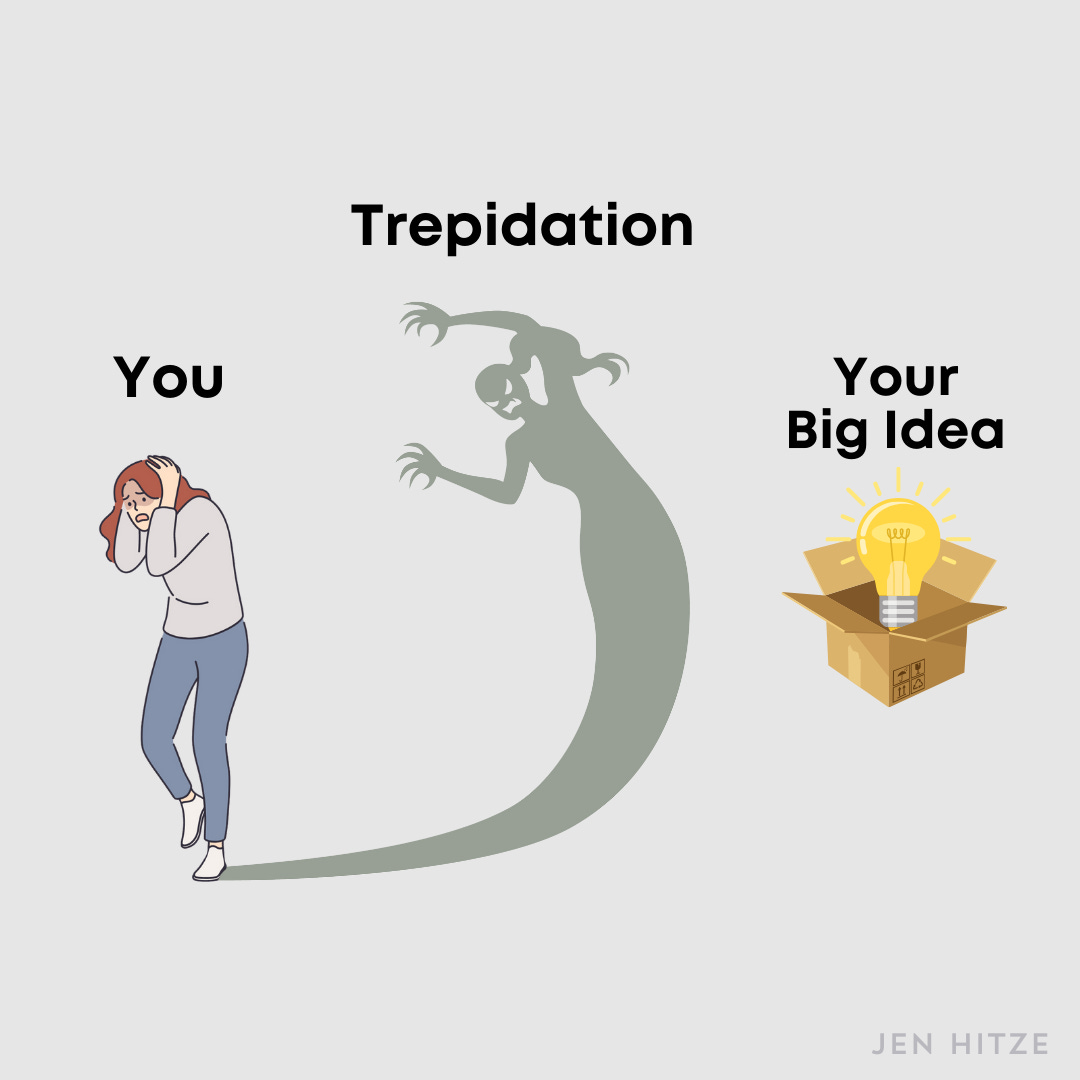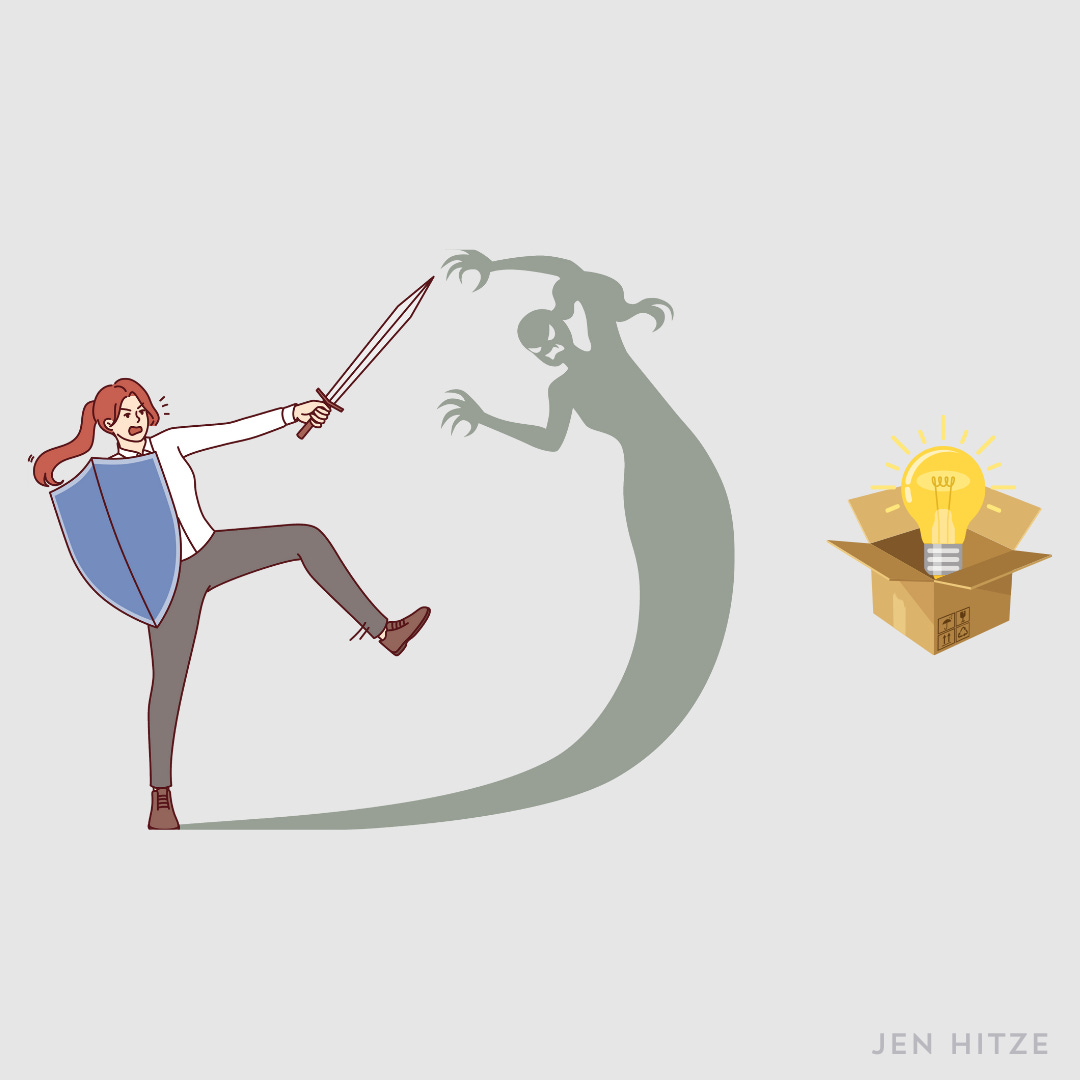I.
T
Trepidation (noun): fear or anxiety about something that you are going to do or experience1
When you choose to embrace and actualize your artistic vision, you’re bound to bump into Trepidation, aka “T.” T typically meanders the abyss of your subconscious, but she never fails to emerge once you begin contemplating doing something bold with your life.
T has good intentions; she really does. She puts herself between you and your big ideas to protect you. She elicits feelings of nervousness and hesitation to make you pause and reconsider. Being a mental construct, T understands what it takes to bring your ambitions to life. It could take months, even years, before you begin to see the slightest sliver of progress. T recognizes how much physical, mental, and emotional labor your big ideas will require to become manifest. And she knows how many times you’ve abandoned your dreams in the past and is rightfully concerned about you facing failure and defeat yet again. T suggests you give up those big ideas and stick to what you’ve always done. After all, you’ve made it this far—drifting, somber, somewhat unscathed. “It’s better than the alternative,” T reckons.
Trepidation is not just a mental and emotional hurdle to overcome; it’s also an omen—a sign that you’re headed in the right direction. In a letter to a friend, Carl Jung once wrote,
The existence of the fear continues because a task is incumbent upon you in the present moment, and, inasmuch as it remains unfulfilled, every day produces fear and guilt anew.2
The question is, of course, what do you feel to be your task?
Where the fear, there is your task!
How do you, the artist, know what you ought to do? You follow your fear and lean into those feelings of unease and apprehension. Instead of evading T, look forward to her arrival.
Where Trepidation is, there lies your Task.
II.
Self-Doubt
To the artist, all problems of art appear uniquely personal. Well, that’s understandable enough, given that not many other activities routinely call one’s basic self-worth into question.
David Bayles, Art and Fear
I don’t know how I feel about this whole Trepidation bit. What will people think? Will they pick up what I’m putting out, or will they dismiss it as dumb and stop reading? Is “trepidation” even the right word to use here, or should I go with a more generic word like “fear?” Should I make it the last idea, or should I lead with it? Should I just scrap it altogether and start over?
What’s perhaps more daunting than trepidation is the tendency artists have to doubt their work (and worth). As a creative, you’re putting yourself and your big ideas out there for the world to see. Are your ideas good enough? Are you good enough?
Before Stephen King became a household name, he worked as a high school English teacher by day and wrote short stories by night. Occasionally, he’d successfully sell a story to a magazine and make a couple hundred bucks to cover the bills. One evening, King had an idea about a teenage girl with telekinetic powers who was bullied for starting her period in the school locker room. After typing up three pages of material on his typewriter, King discarded the idea, believing it was too hard and too long to turn into a short story.
King’s wife, Tabby, found the pages in the trash, brushed off the cigarette ash, and read them. She brought them to bed and told King, “This is good, you should go on.” He replied, “I don’t know that much about girls.” She said, “I’ll help you.”3
Those trashed pages eventually became the early manuscript for Carrie, Stephen King’s first published novel and a massive bestseller. Had King succumbed to his self-doubt—and had his wife not knocked some sense into him— he might not have achieved the incredible success he’s had as a career writer.
While self-doubt is natural, it’s not always helpful. Trust in your ideas and, more importantly, trust in yourself.
III.
Selfish
Your art is your self-love, self-care, self-compassion, self-advocacy, and self-worth. Yes, it is a self-ish thing.
In fact, it might be the only truly selfish thing you do. You spend countless hours in your job doing work for other people. You come home and take care of your partner and family. You attend events that other people want you to be at. You listen to other people’s problems. You buy things to keep up with the Joneses. You donate to charity and volunteer and recycle and support small businesses and pay taxes and vote. Damnit, you deserve something all to yourself. That thing is your art.
Create for yourself. Create because you can. Don’t do it for a boss or for a paycheck or for an audience—that’s not art, that’s work.
There’s a difference.
IV.
Advice
Five quotes from five folks who are much more qualified to give this advice than I am:
Good habits create good art. The way we do anything is the way we do everything. Treat each choice you make, each action you take, each word you speak with skillful care. The goal is to live your life in the service of art.
Rick Rubin, The Creative Act
You must learn how to become a deeply disciplined half-ass.
Elizabeth Gilbert, Big Magic
Every action you take is a vote for the type of person you wish to become. No single instance will transform your beliefs, but as the votes build up, so does the evidence of your new identity.
James Clear, Atomic Habits
If you’re serious about changing your life, you’ll find a way. If you’re not, you’ll find an excuse.
Jen Sincero, You Are a Badass
Who you are is defined by what you’re willing to struggle for.
Mark Manson, The Subtle Art of Not Giving a F*ck
V.
Too Much
All too often, it is audacity and not talent that moves an artist to center stage.
Julia Cameron, The Artist’s Way
Cheryl Strayed recently shared an essay called Diving In, where she recounts how she rekindled her childhood love of swimming because she pushed past all the excuses that made it seem like too much of a hassle—“It was too far, too cold, too windy, too chlorinated, too rocky, too crowded, too hard to find a parking spot, and definitely too much of an ordeal to squiggle into and out of a swimsuit.”
Anything in life that’s worth doing is going to be too much. Stephen King’s Carrie was too hard and too long to make into a short story. These 5 Big Ideas are too demanding and too arduous to publish as consistently as I’d like. Your life’s work is going to be too much, too. Heck, Life itself is too much most of the time.
But if you can find the courage and persistence and boldness to create your art in spite of it being too much, you can become the artist you know yourself to be at your core. Yes, you’ll face trepidation and self-doubt and unwarranted opinions, but you’ll see that they are all just part of the struggle.
The struggle is real—there’s no way around it; there’s only through it.
So go forth. Trust yourself. Dive in. Create.
paraphrased







A very timely reminder, thank you Jen!
Trepidation is a great word and exactly describes the feeling. I’ve often reduced it to fear and I think this is a more approachable word. Thank you!